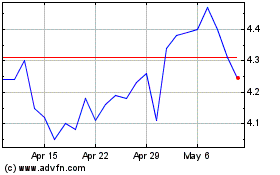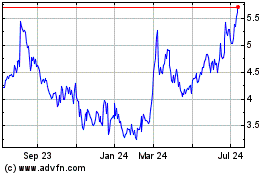Approvals Of New Drugs Down In 2010 Vs 2009, 2008
December 30 2010 - 5:22PM
Dow Jones News
The number of new drugs approved by the Food and Drug
Administration in 2010 looks to be about 21, a relatively low
figure that shows the pharmaceutical industry hasn't yet escaped
its drought in recent years.
A few potential blockbusters won approval during the year, but
others got delayed partly reflecting a tougher regulatory
environment amid ongoing concerns about drug safety.
According to monthly drug-approval reports generated on FDA's
website, 21 new types of drugs were approved in 2010, down from 25
in 2009 and 24 in 2008, but higher from a recent low of 18 in 2007.
Final approval figures as well as the number of applications
received by the agency in 2010 won't be available until next
month.
Although the 2010 figures are a bit lower than previous years,
the FDA said there's "no systemic change in how the FDA is
approaching drug approvals."
Sandy Walsh, an agency spokeswoman, noted that drug applications
come in on a rolling basis making it difficult to compare one
calendar year to another. She said the primary factor driving
approvals "is the quality of the application and the quality of the
data that support the drug's safety and efficacy."
Amgen Inc. (AMGN) won approval for Prolia, a drug that is
injected twice yearly to treat osteoporosis in postmenopausal women
while Roche Holding Ltd.'s (RHHBY) biotech unit, Genentech, won
approval for Actemra, a drug that is administered intravenously to
treat rheumatoid arthritis.
Boehringer Ingelheim GmbH received approval for a new type of
blood-thinning drug, Pradaxa, to prevent strokes in patients with
irregular heart rhythms, potentially replacing much warfarin use,
an old, widely-used anticoagulant approved in 1954.
Patients with multiple sclerosis saw advances in treatment with
the October approval of Novartis AG's (NVS) Gilenya, an oral
product. Multiple sclerosis has traditionally been treated by
injections or infusions. Earlier in the year, FDA also approved
Acorda Therapeutics Inc.'s (ACOR) drug, Ampyra, to improve walking
in MS patients.
In August, the FDA approved ella, a longer lasting emergency
contraceptive that is designed to block pregnancy up to five days
after sex. The product was developed by HRA Pharma, a closely-held
company in Paris, and was launched in the U.S. earlier this month
by Watson Pharmaceuticals Inc. (WPI).
In April Dendreon Corp. (DNDN) won approval for its prostate
cancer therapy Provenge, which had previously been rejected by the
agency. Provenge is designed to use a patient's own cells to
stimulate the body's immune system to fight the cancer and may be
the first in a new class of cancer-fighting drugs.
However, 2010 may be more notable for drugs that weren't
approved as well as for drugs the agency restricted or pulled off
the market.
The FDA refused to approve AstraZeneca PLC's (AZN)
blood-thinning drug Brilinta and asked the company earlier this
month for more information about one of the studies submitted in
support of the product's approval. The also rejected a long-acting
version of diabetes drug Byetta, sold by Amylin Pharmaceuticals
Inc. (AMLN) and Eli Lilly & Co. (LLY), saying more clinical
data is needed to address cardiovascular safety concerns.
In October the FDA declined to approve two proposed weight-loss
drugs from Arena Pharmaceuticals Inc. (ARNA) and Vivus Inc.
(VVUS).
The FDA closed the books on one of the highest profile
drug-safety matters in recent years by sharply curtailing the use
of GlaxoSmithKline PLC's (GSK) diabetes drug Avandia in September
after it was linked an increased risks of heart attacks.
In October the agency removed Abbott Laboratories (ABT)
weight-loss drug Meridia from the market, saying the drug didn't
work well enough to justify potential heart problems. A month later
the makers of decades-old painkillers Darvon and Darvocet agreed to
take those drugs off the market on concerns about an increased risk
of serious abnormal heart rhythms.
In December, the FDA said it would move to revoke the approval
of Roche's cancer drug Avastin for use in breast cancer saying the
product didn't appear to help patients live longer. The decision
won't affect use of Avastin in other types of cancers.
The agency also delayed some decisions in 2010, saying this week
it needed more time to review MannKind Corp.'s (MNKD)
inhaled-insulin product to treat diabetes. It also said it needed
until next March to review Benlysta, a highly anticipated lupus
drug from Human Genome Sciences Inc. (HGSI) and
GlaxoSmithKline.
--By Jennifer Corbett Dooren, Dow Jones Newswires; 202-862-9294;
jennifer.corbett@dowjones.com.
MannKind (NASDAQ:MNKD)
Historical Stock Chart
From Mar 2024 to Apr 2024

MannKind (NASDAQ:MNKD)
Historical Stock Chart
From Apr 2023 to Apr 2024
